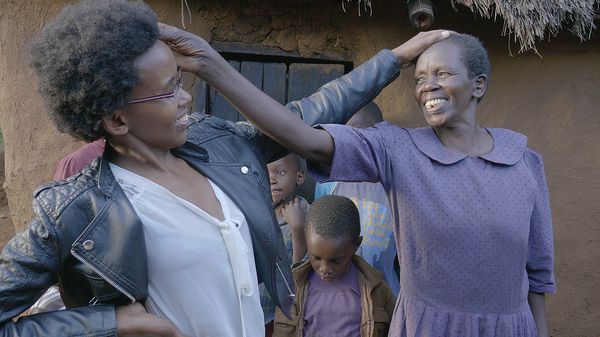Eye For Film >> Movies >> In Search... (2018) Film Review
In Search...
Reviewed by: Jennie Kermode

The idea of sitting through a 90 minute documentary about female genital mutilation (FGM) is something you might understandably find off-putting. It's an important subject yes, but a grim one, and once you've got the general idea, how much more do you really need to learn? Beryl Magoko's film might surprise you. Not only is it packed with information throughout (much of it about subjects like reconstruction which rarely get media attention, but it also contains a surprising amount of laughter and moments of pure joy. It's a film about self discovery with relevance that goes far beyond those directly affected by the practice.
Beryl was just a girl when she went through the process euphemistically known as 'circumcision'. Could she have escaped it? That's difficult to determine. She wasn't physically forced but she was under intense social pressure, and there was internal pressure too. “How do you deal with your history? The history of your ancestors and your mothers... what does it do to you?” is one of the prominent questions addressed in this film.
Whilst she contemplates undergoing reconstructive surgery, Beryl talks to other FGM survivors and explores the psychosocial effect of the experience, something that is just as much a part of each woman's present as her past. She talks about the lasting impact of physical trauma, or being held down whilst it happens (because even for those who consent, in the absence of anaesthetic the cutting can't be carried out any other way). She talks about the emotion that stems from being unable to escape the physical shock to the system remaining trapped in the body, affecting the personality thereafter. Then there are the feelings of guilt, especially among those not physically forced into it. They echo those of rape survivors who didn't fight. How does one cope with having been a participant - however unwilling - in something so damaging?
The social role of FGM is not explored in depth but, rather, allowed to emerge from conversations about traditional roles and expectations, about the role of women in patriarchal societies. “They want to dominate the future woman you will become by cutting you today.” Beryl has an extraordinary conversation with her mother, who talks about her own experience and how the practice has changed over the years, how the cutting used to be much more extensive. The older woman also reveals the toughness once expected of those subjected to it, and how proud they felt if they didn't make a fuss. “If you cried, there would be no ceremony for you.”
If she's been cut before her body has really had time to develop, how does a straight adult woman know what her genitals might otherwise have looked like? The film's most delightful scene involves a shy comparison. Nothing explicit is captured by the camera but the expression on the women's faces is magical, as is the way that the scene incidentally turns conventional ideas about genital beauty - ideas with strong racist connotations - upside down.
With the possibility of genital reconstruction still little known, the discussions of this subject - which include interviews with leading clinical practitioners - are perhaps the most important part of the film. Many of its participants can't figure out where the new part comes from, and some wild suggestions are made. There are anatomy lessons here that may surprise a lot of viewers. But there's also an acknowledgement of the psychological challenges involved in going through the treatment. How does one get reconstructive surgery when afraid of pain in that area and of people touching it?
The very intimate, personal nature of this film imbues with authority and sensitivity. Though it may focus on a body part, it's also about the experience of womanhood, and seeing women learn to celebrate that for the first time is something special.
Reviewed on: 22 Feb 2020















